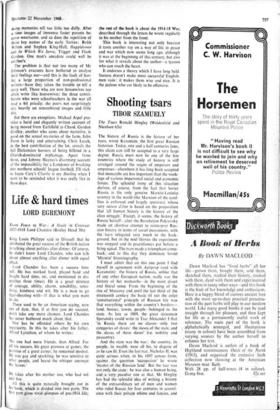Life & hard times
LORD EGREMONT
King Louis Philippe said to Disraeli that he attributed the great success of the British nation to talking about politics after dinner. Of course, he didn't know Lord Chandos, who can talk about almost anything after dinner with equal effect.
Lord Chandos has been a success him- self. He has worked hard, played hard and fought hard (oso, Mc, and mentioned in dis- patches three times). He is a great mixture of courage, ability, charm, sensibility, sensi- tivity, kindness and wit. He is a man to go tiger-shooting with—if that is what you want to do.
There used to be an American saying, now out of date, that, if at first you do succeed, don't take any more chances. Lord Chandos has never bothered much about that.
Nor has he offended others by his own superiority. In this he takes after his father, Alfred Lyttelton, of whom he writes: .
'No one had more friends, than Alfred. For all his success, his great prowess at games, the promise of a great career, he remained modest. He was gay and sparkling, he was sensitive to other people, and heard the whisper amongst the leaves.'
He takes after his mother too, who had wit and fire.
All this is quite naturally brought out in his book, which is divided into two partS. The first part gives vivid alimpses of pre-1914 _life;
the rest of the book is about the 1914-18 War, described through the letters he wrote regularly to his mother from the front.
This book is interesting not only because it casts another ray on a way of life in peace and war which now seems long ago, although it was at the beginning of this century, but also for what it reveals about the author—a tycoon who can touch the heart.
It endorses a theory which I have long held. Success doesn't make most successful English- men vain: it makes them wise and nice. It is the jealous who are likely to be offensive.


































 Previous page
Previous page